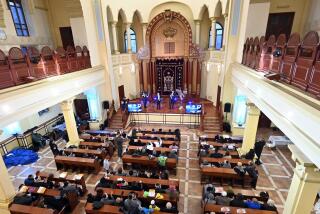Father-Son Leaders of Russian Revolutions : THE GATES OF NOVEMBER Chronicles of the Slepak Family by Chaim Potok. Alfred A. Knopf, $25, 288 pages
- Share via
The remaking of Russia and Eastern Europe in recent years has distracted us from the plight of the Jewish community in those troubled regions, but novelist Chaim Potok’s latest book, “The Gates of November,” is a kind of homage to the courageous dissenters who carried on their own intimate battle with communism, day by day, for decades.
“The individual who crosses the boundary from bystander to activist and hazards his or her life to change the world,” muses Potok, [is] “an eternal mystery. . . .”
Potok is best known as a novelist of Jewish life in America (“The Chosen,” “The Promise,” “The Gift of Asher Lev”), and he brings his own gift for storytelling to a work of history and reportage in “The Gates of November.” Indeed, Potok manages to evoke the themes of Turgenev and Tolstoy and Dostoevsky in his account of the family Slepak.
Volodya and Masha Slepak, like tens of thousands of other refuseniks, were Soviet Jews whose applications for exit visas were turned down by an arbitrary and punishing bureaucracy. At a time when the apparatus of oppression was still very much intact in the Soviet Union, they earned a worldwide reputation as prisoners of conscience who refused to be cowed into submission.
A bitter irony overshadows Potok’s account of the Slepaks. Volodya’s father, Solomon, was born into a traditional Jewish family, and his mother intended him to become a rabbi. But the young man defied tradition, reinvented himself as a revolutionary, and played a shadowy but apparently bloody role in the early years of the Bolshevik regime.
By contrast, Volodya himself rejected his father’s abject loyalty to the Soviet Union after experiencing for himself what it meant to live as a Jew under communism. The word that was stamped on his internal passport--Evrei (Jew)--barred him from employment as a highly trained radio engineer, and he ended up repairing television sets.
“This is happening because there are many traitors and spies among the Jews,” his father insisted, always clinging to the party line. “Later, after careful investigation, everyone who is innocent will be given a job according to his education and knowledge.”
Early in Volodya’s career, his father’s prophecy seemed to come to pass--he was given a lofty position in the Soviet version of the military-industrial complex, but he and his wife were unwilling to make the compromises that Solomon Slepak had made. Stirred by the liberating influences of the Voice of America and the Voice of Israel, the underground publications of the samizdat movement, and a growing network of fellow dissenters, they woke up to a world outside the Soviet Union.
Potok uses the Slepaks as exemplars of a strange, slow-burning, but inextinguishable flame of resistance that started among Russian Jews and, in a real sense, contributed to the ultimate collapse of the Soviet Union. The Slepaks endured beatings, jailings and exile in Siberia, but they stubbornly insisted on confronting their oppressors and bringing their plight to the world’s attention.
“It was the initial battles fought by the friendship circles that prepared the ground for later Jewish struggle,” writes Potok, “which in turn, when it gained force, helped to shore up the democratic human rights moment of the dissident Russians.”
The emblematic moment in “The Gates of November” is an encounter between father and son when Volodya learns that Solomon had cooperated with the Soviet authorities who assembled a list of Jews to be deported in the perilous days after the death of Stalin. To Volodya’s shock, Solomon admitted his complicity even though his own name appeared on the lists.
“You had to be crazy to help them do this against yourself,” Volodya said to his father.
“Suppose I had decided to fight them,” Solomon retorted. “What good would it have done? They could easily have destroyed me.”
Volodya, of course, adopted an entirely different stance--he, along with thousands of others, resolved to fight back against a system that could easily have destroyed them. As history proved--and as Potok shows us in “The Gates of November”--it was the refuseniks who prevailed, and the Soviet Union that was destroyed.
More to Read
Sign up for our Book Club newsletter
Get the latest news, events and more from the Los Angeles Times Book Club, and help us get L.A. reading and talking.
You may occasionally receive promotional content from the Los Angeles Times.










